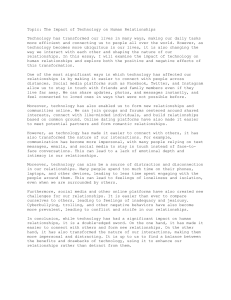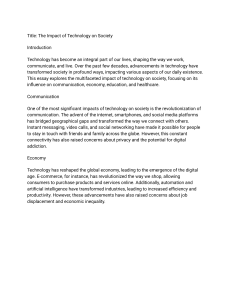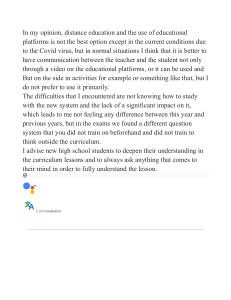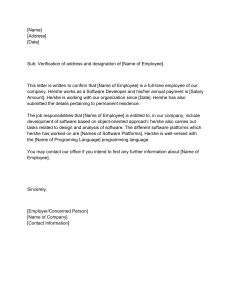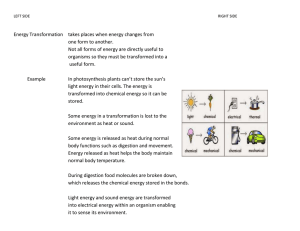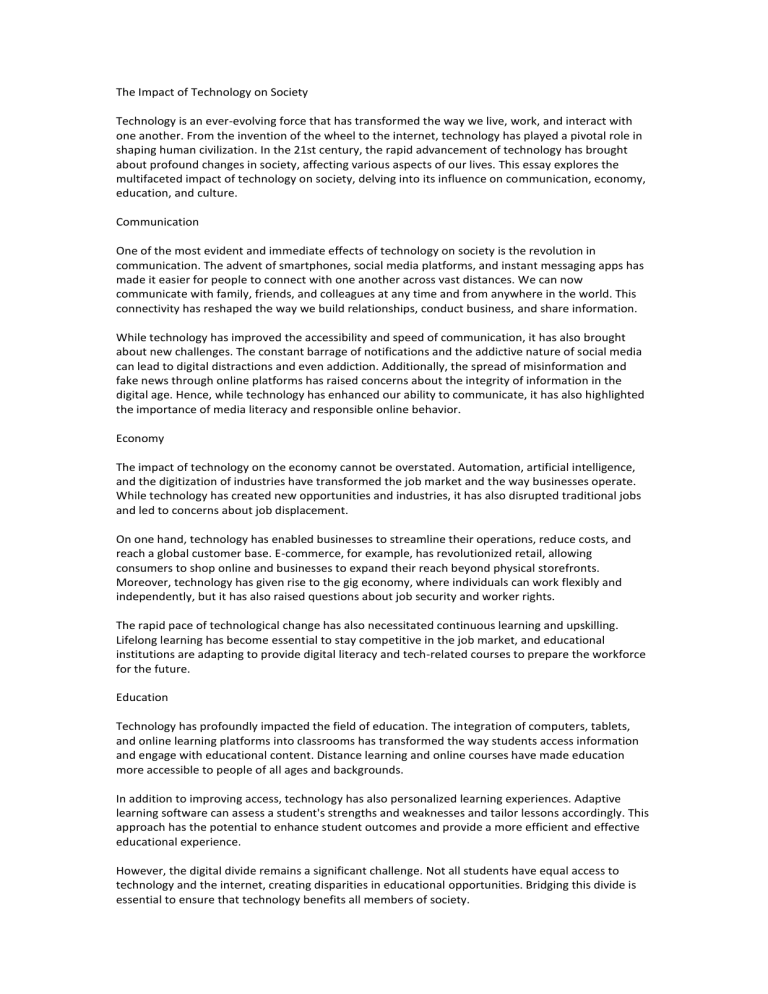
The Impact of Technology on Society Technology is an ever-evolving force that has transformed the way we live, work, and interact with one another. From the invention of the wheel to the internet, technology has played a pivotal role in shaping human civilization. In the 21st century, the rapid advancement of technology has brought about profound changes in society, affecting various aspects of our lives. This essay explores the multifaceted impact of technology on society, delving into its influence on communication, economy, education, and culture. Communication One of the most evident and immediate effects of technology on society is the revolution in communication. The advent of smartphones, social media platforms, and instant messaging apps has made it easier for people to connect with one another across vast distances. We can now communicate with family, friends, and colleagues at any time and from anywhere in the world. This connectivity has reshaped the way we build relationships, conduct business, and share information. While technology has improved the accessibility and speed of communication, it has also brought about new challenges. The constant barrage of notifications and the addictive nature of social media can lead to digital distractions and even addiction. Additionally, the spread of misinformation and fake news through online platforms has raised concerns about the integrity of information in the digital age. Hence, while technology has enhanced our ability to communicate, it has also highlighted the importance of media literacy and responsible online behavior. Economy The impact of technology on the economy cannot be overstated. Automation, artificial intelligence, and the digitization of industries have transformed the job market and the way businesses operate. While technology has created new opportunities and industries, it has also disrupted traditional jobs and led to concerns about job displacement. On one hand, technology has enabled businesses to streamline their operations, reduce costs, and reach a global customer base. E-commerce, for example, has revolutionized retail, allowing consumers to shop online and businesses to expand their reach beyond physical storefronts. Moreover, technology has given rise to the gig economy, where individuals can work flexibly and independently, but it has also raised questions about job security and worker rights. The rapid pace of technological change has also necessitated continuous learning and upskilling. Lifelong learning has become essential to stay competitive in the job market, and educational institutions are adapting to provide digital literacy and tech-related courses to prepare the workforce for the future. Education Technology has profoundly impacted the field of education. The integration of computers, tablets, and online learning platforms into classrooms has transformed the way students access information and engage with educational content. Distance learning and online courses have made education more accessible to people of all ages and backgrounds. In addition to improving access, technology has also personalized learning experiences. Adaptive learning software can assess a student's strengths and weaknesses and tailor lessons accordingly. This approach has the potential to enhance student outcomes and provide a more efficient and effective educational experience. However, the digital divide remains a significant challenge. Not all students have equal access to technology and the internet, creating disparities in educational opportunities. Bridging this divide is essential to ensure that technology benefits all members of society. Culture Technology has had a profound impact on culture, reshaping the way we consume media, express ourselves, and participate in cultural activities. The rise of streaming services has disrupted traditional media like television and radio. People can now choose what, when, and how they consume content, leading to the decline of traditional advertising and the rise of targeted online advertising. Social media platforms have also transformed the way we express ourselves and connect with others. They have become platforms for self-expression, activism, and social change. However, they have also raised concerns about privacy, online harassment, and the impact of social media on mental health. Furthermore, technology has changed the way we engage with the arts and entertainment. Virtual reality and augmented reality have opened up new possibilities for immersive experiences in gaming, art, and entertainment. These technologies have the potential to redefine the boundaries of creativity and storytelling. In conclusion, technology is a powerful force that has reshaped society in numerous ways. It has revolutionized communication, transformed the economy, reimagined education, and influenced culture. While technology has brought about immense benefits, it has also raised complex challenges that require careful consideration and ethical decision-making. Society must continue to adapt to the ever-evolving landscape of technology to harness its potential for the greater good while mitigating its negative consequences.
